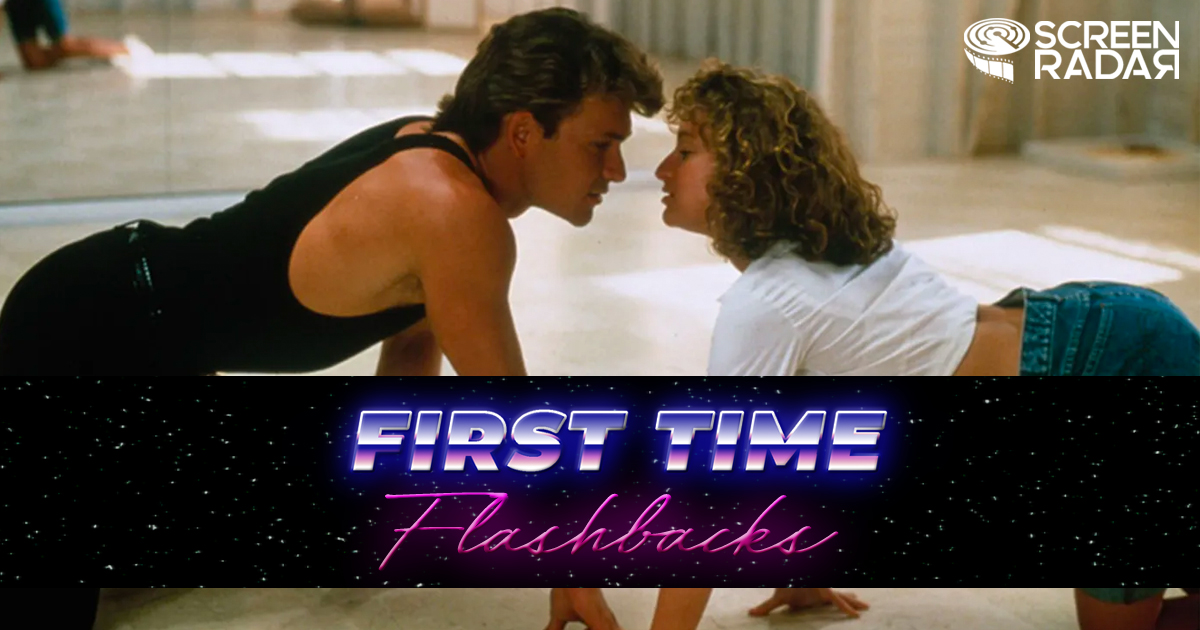
Ok. So. Sometimes I write movie reviews, but this by no means makes me any sort of cinema expert or industry professional. As an English major guy, I’m relying on my training to disassemble and analyze narratives here. And also I really, really like movies, and always have, so anything I know about movies is as a fan and a viewer. As a citizen critic, I don’t have a background in film history, and frankly, my tastes run a bit more pop than art.
Which I’m totally fine with, especially at this point in time. I’m of the generation that’s creating pop culture right now, which means targeted 80s nostalgia is part and parcel with what’s current. I lived through the 80s and I remember it well enough after all – this should be a real sweet spot for me. As far as coming up with a series I thought Screen Radar would be interested in, and super relevant because of current fad cycles, this was going to be a no-brainer. Or at least so I had thought. Where I was hoping to ride that wave of nostalgia with a shrewd article, here and there, reassessing the current cultural callbacks to that neon soaked, hair sprayed era in my signature glib but accessible style, all I found were….sweeping empty gaps in my cinematic catalogue. Hold up. Didn’t I live through this era? Why are there so many movies I haven’t seen?
As it turns out, being a kid with strict parents during the decade of “satanic panic” means there may be some bigger holes in my movie viewing experience that aren’t just comprised of indie, art-house, or foreign films. There are some major gaps – the cultural touchstones that have escaped me are big enough that, now in my 40s, I can no longer fake familiarity with them. I’m ready to come clean, in front of all of you.
What once was to my great shame I think might be sort of fun. I’m inviting you on an adventure, if you’re up for it. Are you with me? We’re going to experience these iconic movies together, and for me, it will be for the first time. Welcome to Phil Bowman’s First Time Flashbacks. I have no idea what to expect, but it’ll be nothing if not gawk-worthy. Each review will reveal my inglorious unfamiliarity with the movie in question, and will be concerned with exactly three things: 1) How does the movie hold up? 2) Is it good or bad? 3) Why or why not? That is to say, you’ll get AT LEAST each of those three questions answered, with the bonus of getting a laugh at my deflowering. Quite the bang for your buck. Are you ready?
First Time Flashbacks, Movie #1: Dirty Dancing
The 80s were dancing obsessed, this much I remember. It wasn’t cool per se, but it definitely seemed to retain a more pronounced entertainment value for audiences than it does now. Maybe the 80s were just where the echo of Fred Astaire’s footsteps were last heard in Hollywood, but it was the last time movies with dancing seemed to abound. It could just be my impression of the time, but there were enough movies about dancing, or dancers, or dancing dancers who danced, that “80s dance movie” sounds like it could be a genuine sub genre. (Hopefully without spoiling the anticipation for you, it’s a type that will show up more than once on this list.)
I am not now, nor have I ever been the target audience for this movie. It’s unamazing that I’ve never seen it, considering where I land on certain demographic charts. Having seen it now, however, is like looking at my memories of the phenomenon that was Dirty Dancing through a newly cleaned windshield. As a boy growing up on a block full of my sisters friends, I was hounded by the already pervasive soundtrack from all too insistent pink cassette players – far from your dream 80s boombox Say Anything scenario (that one I’ve seen). It was, at the time, annoying. But just being a child of the era, I will forever have buried in my soul that first line of Bill Medley’s “(I’ve Had) The Time Of My Life” It’s just been in there, rattling around without any real context for over thirty years.
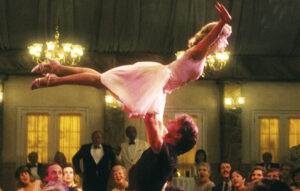 Giving that song the context it has needed for decades was alone worth the watch of Dirty Dancing. But – was it any good? I mean, after the sheer nostalgia even I participated in all while still not even having seen the movie has been rubbed away, what are you left with? I’ll tell you what. For starters, more nostalgia.
Giving that song the context it has needed for decades was alone worth the watch of Dirty Dancing. But – was it any good? I mean, after the sheer nostalgia even I participated in all while still not even having seen the movie has been rubbed away, what are you left with? I’ll tell you what. For starters, more nostalgia.
Distracted with the hair and the neon pink it’s easy to forget what an absolute hard on the 80s had for, oh…say the late 50’s to the early 60’s or so? The Sock Hop/Malt Shop era? Back when boomers were just learning how to, ahem, park their cars. Ah yes, how good were those old days? Dirty Dancing knows, and Dirty Dancing is going to tell you. Part of the fun of this movie, as well as a few of its contemporaries, is that it’s like looking through the binoculars of the 80s to see what happened in the 60s. I find it always interesting and frequently comical to see how a culture – here frozen in time by its medium – compares itself to its own history. Is this movie clumsy about it in places? Oh my, yes, if heavy hands are clumsy ones. But it is so goddamn charming that even the visible seams can’t detract from its successes. (Pardon me as I push these 2020s spectacles back.)
While it’s eminently creepy that the main character Frances goes by ‘Baby’ for almost the entire run-time of the movie, I get the messaging happening here. This is a story of a girl shedding her girlhood to become a woman. It also makes every song, ever, that has the word ‘baby’ in it about her – and by the 60s, that’s pretty much all that’s on the billboard charts. Which is to say it is to be understood that there is important social significance to this story and that we will learn lessons both about the steps involved in life and also dancing.
The thing about dancing in the 80s? Is that its code for sex. Dirty dancing? Well, that’s just even sexier sex. There’s something that goes here about changing sexual ethics…women learning to be women by…taking certain steps with men. Or something. I’m not saying it’s totally impenetrable to me, it’s simply not mine to decipher.
The movie is also part of a common 80s theme of shipping uptown girls and downtown men. Baby’s daddy is a doctor of some means; she, her sister and her mother accompany him to a summer resort with the air of country club exclusivity. The goings on there might best be described as anything you might find happening at any given moment on a cruise ship – and its guests? Also of great overlap with the cruise ship crowd. But the real characters, as at any service industry establishment, are the staff. They are divided into two obvious social castes: the entitled future Ivy Leaguers literally in waiting as the formal dining room’s table side service staff – and the good for nothin’, ne’er-do-well entertainment. Yech. You can practically feel the spit fly into Patrick Swayze’s face as the resort director publicly berates him in front of his peers. After having more or less given his blessing for the waitstaff to try to bed the daughters at the resort, the director turns around to explicitly point out that Swayze here, an entertainer, just ain’t good enough to score such quality tail. What’s more, there’s an actual rule that entertainment staff is strictly forbidden from fraternizing with guests. But no one puts what Baby wants in the corner.
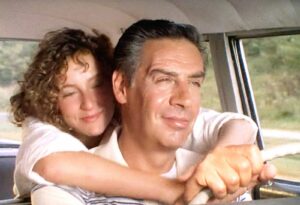 And what Baby wants is Patrick Swayze. And Patrick Swayze IS good enough. He’s Johnny, here – some kind of weird ‘Grease’ induced historical fantasy of the dancing tough guy, stitched out of cartoony frankenstein chunks of bygone bad boys like James Dean and Marlon Brando. It mostly works, and that’s to Swayze’s credit; he can dance, and act, and sing, and genuinely gives the impression of being capable in a dust-up. It also helps that the camera itself is making goo goo eyes at him the entire time. It is not just nostalgia here that’s lending the forgiving glow. Johnnie is an ultimate instant ladyboner. There is an oft rumored moment, mythical, undecipherable in its workings – a moment in which upon seeing a man for the first time, a woman decides whether she would or would not sleep with him. We catch this moment for Baby onscreen as Johnnie makes his entrance and – if it wasn’t clear from him being Patrick Swayze – Johnnie is most definitely a ‘yes.’ This was, in fact, the first time during the production that Jennifer Grey actually laid eyes on Swayze on day one of their filming together; it was director Emile Ardolino’s expressed intent to capture that singular moment. Just kidding, that’s total bullshit. Grey and Swayze actually hated working with each other. But it’s a testament to Grey’s acting ability that it looks like it’s true on screen. Here’s one that’s not bullshit: Grey is 27 in this movie. That she unnoticably passes as a girl in her teens for this whole film was surprising to learn on Wikipedia. You can fact check me there. Go on, I’ll wait.
And what Baby wants is Patrick Swayze. And Patrick Swayze IS good enough. He’s Johnny, here – some kind of weird ‘Grease’ induced historical fantasy of the dancing tough guy, stitched out of cartoony frankenstein chunks of bygone bad boys like James Dean and Marlon Brando. It mostly works, and that’s to Swayze’s credit; he can dance, and act, and sing, and genuinely gives the impression of being capable in a dust-up. It also helps that the camera itself is making goo goo eyes at him the entire time. It is not just nostalgia here that’s lending the forgiving glow. Johnnie is an ultimate instant ladyboner. There is an oft rumored moment, mythical, undecipherable in its workings – a moment in which upon seeing a man for the first time, a woman decides whether she would or would not sleep with him. We catch this moment for Baby onscreen as Johnnie makes his entrance and – if it wasn’t clear from him being Patrick Swayze – Johnnie is most definitely a ‘yes.’ This was, in fact, the first time during the production that Jennifer Grey actually laid eyes on Swayze on day one of their filming together; it was director Emile Ardolino’s expressed intent to capture that singular moment. Just kidding, that’s total bullshit. Grey and Swayze actually hated working with each other. But it’s a testament to Grey’s acting ability that it looks like it’s true on screen. Here’s one that’s not bullshit: Grey is 27 in this movie. That she unnoticably passes as a girl in her teens for this whole film was surprising to learn on Wikipedia. You can fact check me there. Go on, I’ll wait.
…right? Crazy.
And, all right, I’ll admit, I’ve talked a lot about Patrick Swayze so far – but there’s a lot of ‘ideal man’ messaging with Johnnie that I find interesting, and strangely contradictory – he’s a ‘bad boy,’ but he’s polite. He’s clearly proud, but also self-effacing. He’s honest, and yet misunderstood. He’s tough, and he’s tender. In a word, he’s impossible. A unicorn. If you want to know what the ideal man of the 80s was, look no further than its anachronisms of the 60s. Thing is, despite the often comical earnestness of his almost Mid-atlantic line delivery, Swayze pulls it off, and would still steal this movie even if the genre hadn’t prescribed that he must.
This isn’t to say that Dirty Dancing isn’t Jennifer Grey’s movie. She proves it in the effortlessness with which she steals it back from her co-star. Her easy, watchable style and winning manner could carry this movie all by itself. She’s natural. She’s awkward. A little goofy. Grey gives a sense of a lack of worldliness that’s difficult to convincingly portray in movies; usually its very wink-and-nod or overplayed to silliness. But Grey nails youthful inexperience so well, I think I may be writing this entire article just to point it out.
When describing the type of women he included in his nudie mags, Hugh Hefner always described the playmates as “the girl next door.” This is so incongruent to the actual content of Playboy Magazine that its clear no one laughed in Hef’s face hard enough when he first came up with it. Good lord. Playmates? “Girls-next-door?” Come on. Don’t get me wrong, brassy, overdone, underdressed bottle blondes have their place in the pantheon of types, but “girl-next-door” is not it. Not remotely. But you know who is? Jennifer Grey. The woman has heaps of next-door-iness, she has it in spades, and in Dirty Dancing, she shoots the effing moon. THIS is the girl next door. She’s thoroughly appealing. You don’t get the sense she’s Clooney-ing the role, necessarily – but everything that feels authentic and interesting about ‘Baby’ is due to Grey’s charisma. She’s a little whiny and naive sometimes, but so’s Luke Skywalker, and it’s all part of an arc, a progression of a character through a story that changes them. The moment she fails in her first public performance of “the Lift” is an effective emotional let-down AND Grey handles the moment like a champ – the scene almost demands that you cringe in empathic embarrassment, and the awkward play for comedy in the middle of the dance routine should make it worse. But it doesn’t. It’s almost a relief that she chokes. If you’ve ever publicly failed before, you know what a load off your mind it is. But public failure is not a corner that Baby is going to stay in.
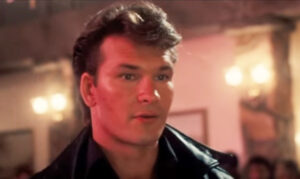 The rise and fall of the action of Dirty Dancing is designed around literal rises and falls – emotional climaxes, orgasms, dance moves – the pursuit of, the denial of, the achievement of. These are pretty standard story beats, and I don’t mean to sound so over them, except I want to focus on the point of how well this movie hits them. It’s not inappropriate that it might be described as being with something like a dancer’s precision. It’s the right music with the right performer. Grey takes us through the steps of this character’s progression, her advances and setbacks, hitting the right moves in an effortless looking stride. Minus the (for the day) explicit sex and centering of social issues, the plot – the antics – of Dirty Dancing, are almost a riff on a classic screwball black and white musical. That Frances is required to step up into a role as a performer for which she has little qualification seems odd; that Johnnie is friendly Dannie Zuko is suspicious; that the whole narrative is supposed to take place in a matter of days is telling. But it doesn’t matter, these are forgivable seams in a sweeping narrative of a graduation out of innocence, and into responsibility. All lubed with an incredible soundtrack on which we’re treated to the dulcet singing tones of one of the film’s top billed stars. If they could have made it a musical, they would have, but by then that genre had fallen squarely into the clutches of Disney-princessdom.
The rise and fall of the action of Dirty Dancing is designed around literal rises and falls – emotional climaxes, orgasms, dance moves – the pursuit of, the denial of, the achievement of. These are pretty standard story beats, and I don’t mean to sound so over them, except I want to focus on the point of how well this movie hits them. It’s not inappropriate that it might be described as being with something like a dancer’s precision. It’s the right music with the right performer. Grey takes us through the steps of this character’s progression, her advances and setbacks, hitting the right moves in an effortless looking stride. Minus the (for the day) explicit sex and centering of social issues, the plot – the antics – of Dirty Dancing, are almost a riff on a classic screwball black and white musical. That Frances is required to step up into a role as a performer for which she has little qualification seems odd; that Johnnie is friendly Dannie Zuko is suspicious; that the whole narrative is supposed to take place in a matter of days is telling. But it doesn’t matter, these are forgivable seams in a sweeping narrative of a graduation out of innocence, and into responsibility. All lubed with an incredible soundtrack on which we’re treated to the dulcet singing tones of one of the film’s top billed stars. If they could have made it a musical, they would have, but by then that genre had fallen squarely into the clutches of Disney-princessdom.
The movie is full of these turning point moments – Baby sheds her daddy’s girl identity. Loses her v. Learns to dance. Falls in love. And gets a glimpse of what life is like for those without privilege. Its a tour de force of our modern rites of passage. It has left an indelible mark on the psyche of an entire generation of women, and then some. It reflects back a changing ethic that we begin to recognize as modern and liberating – a progressive hope for a better future wrapped in an object lesson of the past, as it were. But this, this is all too analytical. You’re meant to watch this movie from your loins. You’ve got to feel your way through it, the way dancers in movies always say you’ve got to feel the music – whatever that means. Don’t get caught up in the fact this entire story takes place inside of a week, for one. You may laugh at Swayze’s earnest, Leave-It-To-Beaver delivery of the Gigolo Monologues, but just know that for all the soul-wounding adultery, Johnnie is a reformed bad boy who’s been to the end of that road. Despite the vibe he throws – morally? The man is blameless. This is clearly the era where bad boys were not yet bad boys for life. So, listen, don’t worry about whether or not Johnnie’s abandoned one set of unhealthy patterns and simply developed other slightly different unhealthy patterns in their place. You need to get swept up in this. This is the point. And, it’s better this way. You don’t ride the roller coaster for any other reason than to indulge the thrill.
And a thrill it is. The adolescent hormonal energy (everyone’s so sweaty you practically need to crack a window), the leftward plot turns, the careening crescendos of music, the soft lit late summer nights. For its occasional missteps and awkwardness, it glides on its own effervescent inertia the same way Jennifer Grey does as Baby, as Frances. It takes a long time to get to where it’s going, but any movie that wistfully starts with “It was the summer of 19(such-and-such)…” can hardly be held to any other expectation. But again, this is the point. This is about the journey. Some narratives are so aimed at their own climatic turning point that they forget there are other parts of a story – but not Dirty Dancing.
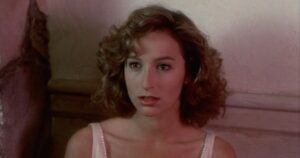 What’s more is, despite the audience pretty much being able to call out what’s around the corner narratively speaking, the movie is still indisputably watchable. I mean…we have a sense of where this is all going to go the whole time, don’t we? We know that no one puts Baby in the corner even before we have it pointed out for us. We know Johnnie’s going to get his moment, eventually. We know vindication must be coming. There is a sense this is not, at heart, a tragedy. In fact, the hijinx are too damn Shakespearean (seriously), there can’t be anything at the end but a resolve. But. So what? The reason you stood in line and rode the roller coaster was for the purpose of getting to the departure platform at the end of the ride? No. So, for all the ridiculousness of this story unfolding in a smaller timespan than days between some people’s laundry loads, the story beats of the film are paced well. Some scenes suffer themselves to last a little too long, as scenes of this era of movies often do, but the scenes themselves are never flat. And you are meant to soak in them. It’s one thing I really miss about 80s movie-making sensibility. It did not cut to the chase, by any means. It’s a Sunday drive up to the narrative climax, and it is all the sweeter for how long it took. There is a lost art of delay to be appreciated here. The plot is based entirely around a boondoggle of misunderstandings, and it is not quick to unknot itself. But when it does, it is satisfying. The true villain driving the plot is revealed. Johnnie gets his say and his day in the sun. Baby’s dad eats his words. And Baby? Oh, Frances, you mean? She EARNS. That. Damn. Lift.
What’s more is, despite the audience pretty much being able to call out what’s around the corner narratively speaking, the movie is still indisputably watchable. I mean…we have a sense of where this is all going to go the whole time, don’t we? We know that no one puts Baby in the corner even before we have it pointed out for us. We know Johnnie’s going to get his moment, eventually. We know vindication must be coming. There is a sense this is not, at heart, a tragedy. In fact, the hijinx are too damn Shakespearean (seriously), there can’t be anything at the end but a resolve. But. So what? The reason you stood in line and rode the roller coaster was for the purpose of getting to the departure platform at the end of the ride? No. So, for all the ridiculousness of this story unfolding in a smaller timespan than days between some people’s laundry loads, the story beats of the film are paced well. Some scenes suffer themselves to last a little too long, as scenes of this era of movies often do, but the scenes themselves are never flat. And you are meant to soak in them. It’s one thing I really miss about 80s movie-making sensibility. It did not cut to the chase, by any means. It’s a Sunday drive up to the narrative climax, and it is all the sweeter for how long it took. There is a lost art of delay to be appreciated here. The plot is based entirely around a boondoggle of misunderstandings, and it is not quick to unknot itself. But when it does, it is satisfying. The true villain driving the plot is revealed. Johnnie gets his say and his day in the sun. Baby’s dad eats his words. And Baby? Oh, Frances, you mean? She EARNS. That. Damn. Lift.
There is nothing I appreciate more in storytelling than a story that earns its payoff moment. Dirty Dancing nails it. Unwrapped, demummified of its nostalgia, it still retains connectivity with the audience across not just the space of tv to couch, but across time, fad, and fashion, too. So, to answer the three most pertinent questions of a First Time Flashback movie review: Does it hold up? Yes. And the whys and wherefores of which I’ve just attempted to explain. But…Is it good? Was Dirty Dancing any good? Did you, Phil Bowman, like this movie? I don’t know how best to answer that, exactly. But after 30 some years – finally – what I can say for certain is: I. Had. The time of my liii-iife.

